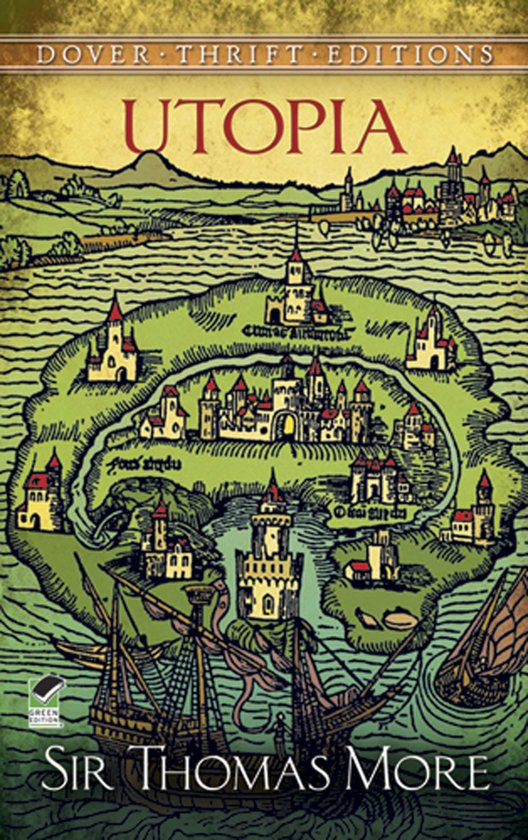The term “Utopia” refers to an imaginary or idealized place or society in which the conditions are perfect, and everything is ideally organized for the well-being and happiness of its inhabitants. The concept of Utopia typically embodies the idea of an ideal or perfect world, often characterized by qualities such as social and political harmony, equality, prosperity, and justice. However, Utopia is often unattainable in reality and serves as a literary or philosophical exploration of a better and more just society.
The word was coined by Sir Thomas More in his 1516 book “Utopia,” where he described an imaginary island with an ideal social and political structure. Since then, “Utopia” has become a term used to describe any visionary or idealized society or concept.
The word “Utopia” is derived from the Greek words “ou,” meaning “not,” and “topos,” meaning “place.” Therefore, “Utopia” etymologically means “no place” or “nowhere.” In English, Utopia is pronounced the same as Eutopia, meaning “good place”. This name conveys the idea that such a perfect society does not exist in reality but is rather an idealized and unattainable concept.
Initially, More named the island “Nusquama,” which is the Latin equivalent of “no-place.” However, he later decided to use a name with Greek influence, and that’s how he came up with the name “Utopia” for his fictional island.
The title De optimo rei publicae statu deque nova insula Utopia literally translates, “Of a republic’s best state and of the new island Utopia”.
The first original name was even longer: Libellus vere aureus, nec minus salutaris quam festivus, de optimo rei publicae statu deque nova insula Utopia. That translates, “A truly golden little book, no less beneficial than entertaining, of a republic’s best state and of the new island Utopia”.
The story is written from the perspective of More himself. More uses his own name and background to craft the narrator of the story. The book is divided into two parts: Book one: Dialogue of Council and Book two: Discourse on Utopia. These two parts serve as the framework for the exploration of the ideal society described in the work.
Book One: Dialogue of Counsel
It consists of a fictional conversation between More and a traveler named Raphael Hythloday, who has recently returned from a journey to the island of Utopia. During this dialogue, More, the character, acts as an inquisitive and somewhat skeptical interlocutor.
More and Hythloday engage in a philosophical discussion about the state of European society at the time, with More expressing his concerns about the political and social injustices, the rampant poverty, and the corruption of the legal system. Hythloday, on the other hand, describes his experiences and observations on the island of Utopia. He introduces the concept of this ideal society, highlighting its unique customs, governance, and way of life.
Book Two: Discourse on Utopia
It provides a comprehensive vision of the Utopian society, where communal living, social equity, and rational governance create an ideal way of life. It serves as a thought-provoking exploration of alternative societal structures and values.
Geography and Layout: More describes the geography and physical layout of the island of Utopia. He provides information about its rivers, cities, and agricultural practices, including the efficient use of land and resources.
Social Structure: Utopia has a well-organized social structure, with households, families, and communities at its core. The Utopians practice a form of communism, where wealth and property are held in common, and everyone works for the common good.
Government: The Utopian government is based on principles of justice and equality. Officials are elected, and they serve limited terms. The legal system emphasizes arbitration and reconciliation rather than punishment.
Education: Education is highly valued in Utopia, and both men and women receive a comprehensive and practical education. Learning and intellectual pursuits are encouraged.
Religion: Utopia practices religious tolerance, allowing freedom of worship. However, atheists are not allowed to hold public office, as they are considered to lack moral grounding.
Economy: The Utopian economy is focused on meeting the basic needs of the population. Trade is minimal, and money is not used for daily transactions. People work a limited number of hours, leaving them with ample leisure time.
Marriage and Family: Marriages are arranged, and divorce is permitted in cases of incompatibility. Families are an essential unit of society, and children are raised collectively.
Travel and Communication: Utopians are encouraged to travel and experience other cultures. They have an efficient system of communication and transportation.
